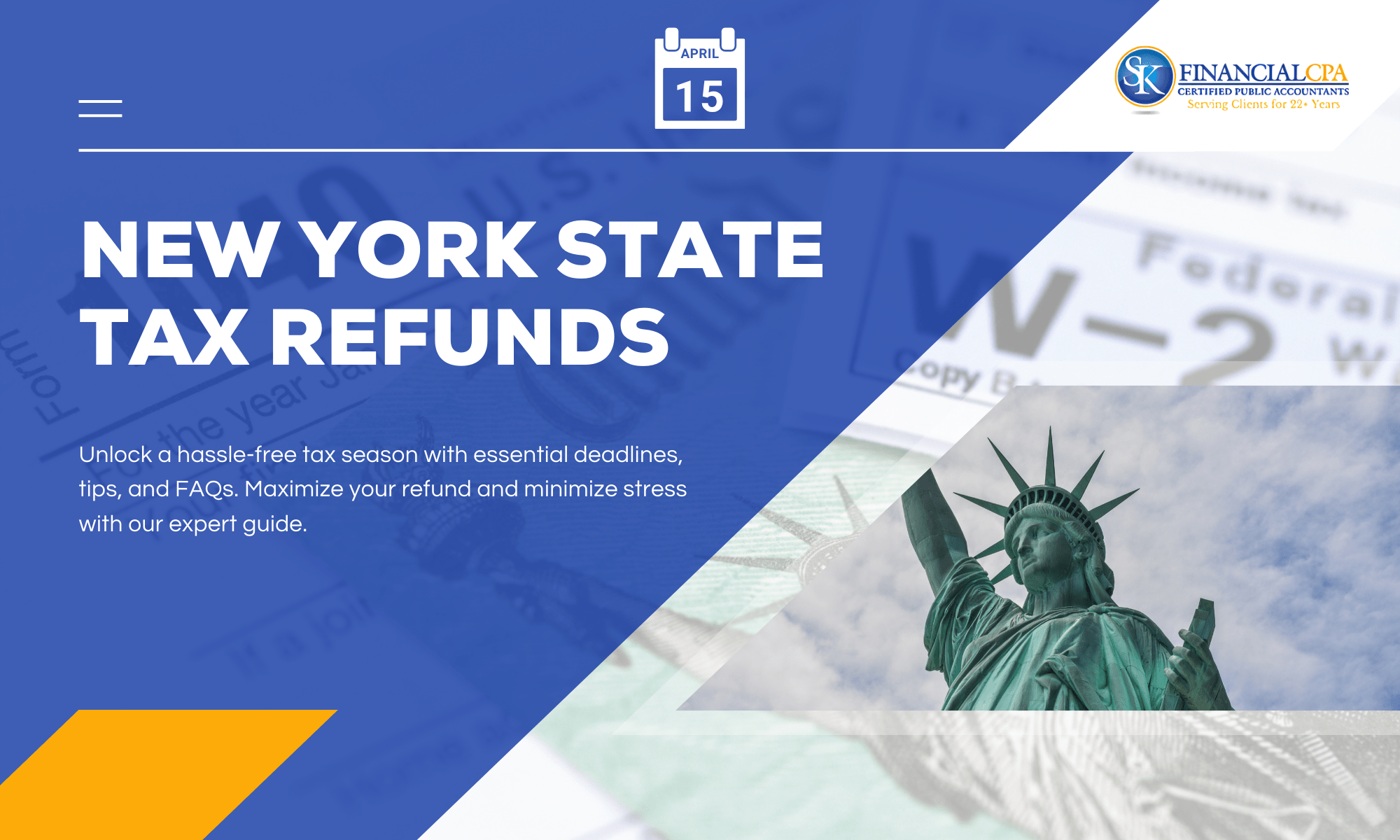
How do I Check the New York state tax refund? Complete Detailed
The tax season often brings a mix of anticipation and anxiety as individuals and families navigate through complex tax codes and deadlines to fulfill their civic duties. For residents of New York State, understanding the nuances of state tax filing can make a significant difference in securing a timely and accurate tax refund. This comprehensive guide aims to demystify the process, offering key insights and resources to manage your 2023 tax obligations efficiently.
Where's my state refund in New York?
To check the status of your New York state tax refund, visit the official website of the New York State Department of Taxation and Finance and use their "Where's My Refund?" tool. Simply enter your Social Security number, refund amount, and filing status to track your refund's progress.
When are 2023 Taxes Due?
The official deadline for filing your federal and New York State income tax returns for the 2023 tax year is April 15, 2024. However, if this date falls on a weekend or a recognized holiday, the deadline is moved to the next available business day. Procrastination can lead to unnecessary stress or penalties, so it's advisable to mark this date early and prepare ahead.
How Do I File My 2023 Taxes?
Filing taxes has become more accessible thanks to a variety of methods suited to different preferences and needs. Whether you opt for the expertise of a professional tax preparer, the convenience of tax preparation software, or the traditional approach of manually completing and mailing your forms, it's essential to choose the method that best fits your situation. For New Yorkers, electronic filing via New York State Tax Department's online services or approved third-party software is encouraged. Electronic submissions are not only more secure but also facilitate quicker processing times.
How Can I File My Tax Return for Free?
The cost of filing taxes can be a concern for many. Fortunately, if your income is below a certain level, you may be eligible to file both your federal and New York State tax returns free of charge. The IRS Free File program is available to individuals with an adjusted gross income of $73,000 or less, offering free access to tax preparation software. Similarly, the New York State Tax Department provides resources and links for residents who meet certain income criteria to file their state taxes at no cost.
How do I get my W-2?
The W-2 form is a crucial document that outlines your annual earnings and the taxes withheld. Employers are mandated to dispatch these forms by January 31 each year. If you do not receive your W-2 by mid-February, contact your employer to verify your mailing address. In instances where the W-2 remains undelivered, the IRS can help you track down this essential document.
When Can I Expect My Tax Refund?
For many, the tax refund is a highly anticipated financial boost. New York State typically processes electronic returns within two to four weeks, whereas paper returns can take six to eight weeks. The "Check Refund Status" feature on the New York State Tax Department’s website is a valuable tool for tracking your refund. Accuracy and completeness in your tax return are vital for avoiding processing delays.
What Tax Bracket Do I Fall In?
Your tax bracket is determined by your taxable income and filing status, which influence the rate at which your income is taxed. New York State's progressive tax system includes eight brackets, with rates ranging from 4% to 10.9% for the 2023 tax year. Detailed tax rate schedules are available on the New York State Tax Department's website, allowing you to ascertain your applicable tax bracket.
|
Taxable Income Range |
Tax Rate (%) |
|
$0 to $8,500 |
4.0 |
|
$8,501 to $11,700 |
4.5 |
|
$11,701 to $13,900 |
5.25 |
|
$13,901 to $21,400 |
5.9 |
|
$21,401 to $80,650 |
6.33 |
|
$80,651 to $215,400 |
6.85 |
|
$215,401 to $1,077,550 |
9.65 |
|
Over $1,077,550 |
10.9 |
Other Important Tax Dates
While April 15 is the primary deadline to keep in mind, several other dates throughout the tax year are equally important:
-
January 31: This date is critical for both employers and employees, as employers must issue W-2 forms by this date. It's also the deadline for financial institutions to send out various forms that report income other than wages, such as Form 1099-INT for interest and Form 1099-DIV for dividends.
-
February 15: Financial institutions should have sent out Form 1099-B, which details proceeds from broker transactions and barter exchanges. This is an essential document for reporting capital gains and losses.
-
March 15: The due date for partnership returns (Form 1065) and S-corporation returns (Form 1120S). This deadline is vital for those involved in partnerships or S-corporations, as these entities pass profits or losses to their partners or shareholders.
-
April 15: is the primary deadline for filing federal and state tax returns or requesting an extension. Additionally, it marks the due date for the first quarter's estimated tax payment for the current year.
-
June 15: U.S. citizens or resident aliens living abroad have until this date to file their tax returns or request an extension. It also serves as the due date for the second quarter's estimated tax payment.
-
September 15: If you requested an extension for your partnership or S-corporation returns, they must be filed by this date. This is also when the third quarter's estimated tax payment is due.
-
October 15: The final deadline for individuals who requested an extension to file their tax returns.
By staying informed and proactive, you can confidently navigate the tax season. Utilizing the resources and services provided by the IRS and the New York State Tax Department will help ensure that you meet your tax obligations effectively, maximize your refund potential, and minimize any potential stress. Remember, the key to a smooth tax season is early preparation and a thorough understanding of your tax responsibilities.
FAQs
What if I miss the April 15 deadline?
If you miss the April 15 deadline without requesting an extension, you may be subject to late filing and payment penalties. It's crucial to file as soon as possible to minimize these penalties. If you expect to owe taxes, paying an estimated amount before filing can help reduce penalties and interest.
Can I request an extension to file my taxes? How?
Yes, you can request an automatic six-month extension to file your taxes by submitting Form 4868 to the IRS before the April 15 deadline. However, this extension applies to filing your taxes, not to any taxes owed. If you expect to owe, it's advisable to estimate and pay your taxes by April 15 to avoid penalties.
What should I do if I make a mistake on my tax return?
If you discover an error on your tax return, you can amend it by filing Form 1040-X. This form can be filed electronically or on paper, but it's important to address any mistakes promptly to correct your tax liability or claim a refund if you're owed one.
How can I check the status of my tax refund?
You can check the status of your federal tax refund using the IRS's "Where's My Refund?" tool online or through the IRS2Go app. For New York State refunds, use the "Check Refund Status" tool on the New York State Tax Department's website. You'll need to provide some basic information, such as your Social Security number and the exact amount of your expected refund.
What if I can't pay my taxes in full by the deadline?
If you're unable to pay your taxes in full by the deadline, the IRS offers payment plans and installment agreements that allow you to pay over time. It's important to file your tax return and apply for a payment plan as soon as possible to minimize interest and penalties.
Are there any deductions or credits I should not miss?
Taxpayers often overlook certain deductions and credits that can lower their tax bill. Some common ones include the Earned Income Tax Credit, education credits, and deductions for charitable contributions and medical expenses. Review the IRS guidelines or consult a tax professional to ensure you're taking advantage of all applicable tax benefits.
How long should I keep my tax records?
The IRS recommends keeping copies of your tax returns and supporting documents for at least three years after the date you filed your original return or two years from the date you paid the tax, whichever is later. However, if you've filed a claim for a loss from worthless securities or bad debt deduction, keep your records for seven years.
Follow SKFinancial on Facebook / Twitter / Linkedin / Youtube for updates.








